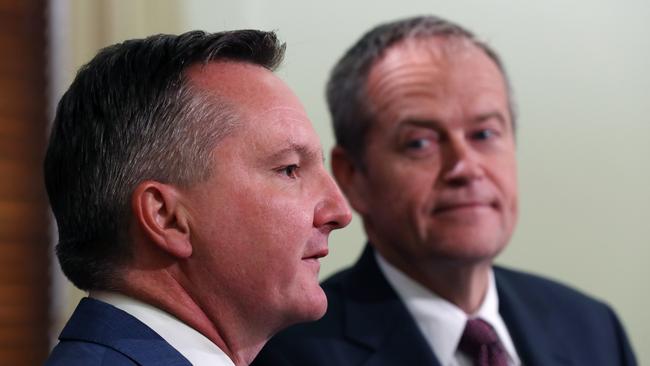
On budget night it was clear to me that next month’s poll would be an intergenerational election pitching younger Australians against their parents and grandparents.
I expected opposition leader Bill Shorten would oppose my scenario, so I was stunned that he has embraced my theme to tackle what he calls “the intergenerational unfairness in our tax system”.
He isolates two “intergenerational” ALP policies: negative gearing and franking credits. Today I will look at the intergenerational fairness issues created by the proposed changes to negative gearing and tomorrow franking credits.
On negative gearing, the impact will depend on whether UBS or Harry Triguboff is right.
UBS forecasts further significant residential property price falls, which would mean the ALP intergenerational policy will create great suffering. Triguboff says the market has bottomed and, if he’s right, the ALP policy will cause limited damage and achieve its objectives.
Harry has won the first round and, after the budget and the Shorten reply, the Sydney and Melbourne auction clearance rates rose.
But before looking at the negative gearing issues lets revisit Bill Shorten’s actual words in his budget reply:
“We believe the Australian people are hungry for a united, stable government with a real vision for the future, one that can make hard decisions.
We believe government has a responsibility to leave the place better than we found it.
“That’s why we’re going to stop the intergenerational unfairness in our tax system.
“If you’re currently negatively gearing the rules won’t change.
“If you want to use it on new homes, you still can.
But we cannot have property investors playing with loaded dice against our young people, Generation Y and the millennials. (people aged between 20 and 35)
And instead of patronising millions of young Australians with lectures about cutting back on smashed avo, why don’t we tell them the truth:
Getting together a 20 per cent deposit — plus stamp duty — is so much, much harder than it was 20 or 25 years ago.
And it’s even more difficult, when your government uses your taxpayer money to subsidise the property investors bidding against you.
The intergenerational bias that the tax system has against young people must be called out.
A government has to be brave enough and decent enough to stop the bias against first home buyers and young Australians.”
Fine sounding words. Now the issues.
We have just been through a residential property boom partly created by negative gearing, but the main force was loose bank credit often using inflated borrower incomes and unrealistically low expenses. The big winners from the boom have been parents and grandparents who bought dwellings at much lower prices decades ago.
But in the last three years a large number of millennials borrowed to the hilt and bought dwellings at the peak. Many were guaranteed by their parents. We have now changed the credit rules reducing the availability of bank money by between 20 and 30 per cent sending dwelling prices down and creating negative equity situations for many millennials and extreme nervousness among their parents who guaranteed them. We also hit the older generation by changing the investor lending rules.
While the house prices fell, millennials wanting to own a home were in theory no better off because their borrowing ability was reduced. Many have been able to overcome this via more parent guarantees and borrowing from smaller banks and lending institutions and some investors have bought dwellings before the ALP policy comes in.
If the ALP wins the election, from July 1 any investor buying an existing dwelling will be able to offset interest and costs against their rent but not against their salary. That clearly reduces the value of an existing dwelling to an investor — and that’s exactly what Bill Shorten and Chris Bowen want to achieve when they seek to benefit those aged between 20 and 35 who do not own a home.
When Chris Bowen announced this policy three years ago it was exactly what Australia needed to offset the boost to dwelling prices created by the loose lending policies of the banks. If Harry Triguboff is right, then if introduced in 2019 it will curb dwelling price rises but not further damage the market.
If UBS is right there will be another market fall which will greatly damage the economy led by non-discretionary retail sales. Unemployment will rise.
The ALP danger is that its negative gearing policy is now coming at the same time as a credit squeeze. If the ALP wins and the UBS scenario plays out, then. Bowen will need to be very agile and call the APRA and ASIC dogs off the banks or the community will suffer deep blows.
And guess who will suffer most? The millennials and their guaranteeing parents who bought dwellings during the boom. Higher rents will send many other millennials back to live with their parents.
Longer term this is good policy for those wanting to increase home ownership but bad for renters because rents will need to rise to make property investment worthwhile.
It is being introduced at a very dangerous time. If they win the election Bill Shorten and Chris Bowen will need to recognise the dangers and react quickly if things start to go wrong.




